Wings of Hope for Pancreatic Cancer Research
DECEMBER 2015
On December 21st, Elizabeth "Betty" Bowker, 82, of Winchester, Massachusetts, lost her battle with pancreatic cancer. The Bowker family has been impacted by pancreatic cancer to a heart breaking degree. In 2003 Betty Bowker's ex-husband died from pancreatic cancer and in 2014 her son, Calvin, passed away months after being diagnosed. For WINGS OF HOPE board member Kathryn (Bowker) Haber, this has been the loss of her father, brother and mother to pancreatic cancer. Our thoughts, prayers and hearts are with the Bowker family, with a renewed commitment to keep funding the ongoing pancreatic cancer research at the University of Colorado Cancer Center-Anschutz. The urgent need for early diagnostic methods, more effective treatments and ultimately a cure is dependent on the aggressive funding effort that moves the research forward. In lieu of flowers the Bowker family has graciously requested donations in Betty's memory be made to WINGS OF HOPE.
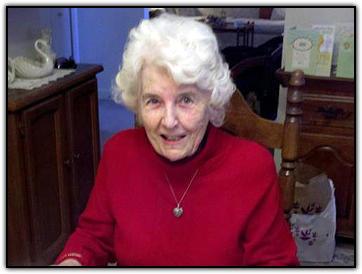
Elizabeth "Betty" Bowker
September 2015
Former State Senator PAUL SANDOVAL, who passed away in April 2012 after courageously battling pancreatic cancer for a little over a year, was honored Saturday, September 12th with the dedication of the PAUL SANDOVAL CAMPUS located on the Denver Public School property that is home to Northfield High School. The sprawling campus is a fitting tribute to Paul's passion for public service, community and education. Participants in the dedication ceremony included Paul's wife PAULA (former State Senator and Denver City Council Member), former U.S. Secretary of the Interior KEN SALAZAR, Denver Mayor MICHAEL HANCOCK, numerous Denver City Council Members and past and current DPS officials. As WINGS OF HOPE board member, PAULA SANDOVAL is part of the effort to raise awareness and funding for the pancreatic cancer research at the University of Colorado Cancer Center.
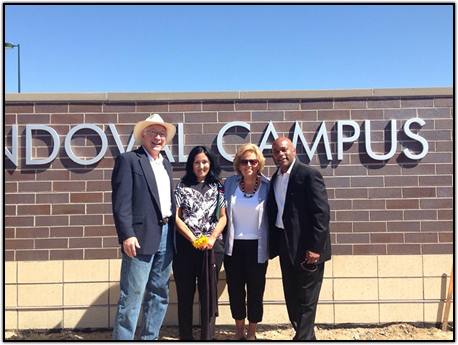 Secretary Ken Salazar, Paula Sandoval, Maureen Shul and Denver Mayor Michael Hancock
Secretary Ken Salazar, Paula Sandoval, Maureen Shul and Denver Mayor Michael Hancock
 Paul Sandoval
Paul Sandoval
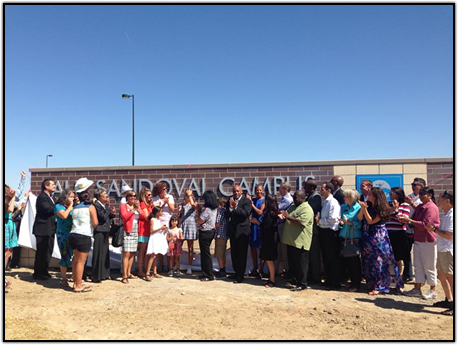 Unveiling of the Paul Sandoval Campus
Unveiling of the Paul Sandoval Campus
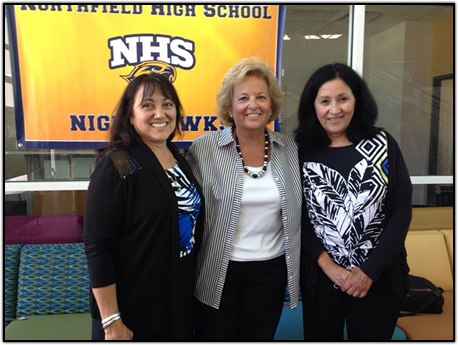 Denver City Councilwoman Debbie Ortega, Maureen Shul and Paula Sandoval
Denver City Councilwoman Debbie Ortega, Maureen Shul and Paula Sandoval
September 2015
Thank you to the incredible women at South Metro Denver Chamber for inviting Maureen Shul to speak at their recent Women in Business Conference where she described the journey to establishing WINGS OF HOPE, and all the lessons learned along the way. Kudos to Sue Kenfield, Kimberly Alexander and Holly Mullins for putting together such an excellent conference for women in all realms and roles of business.
 Sue Kenfield, Maureen SHUL and Kimberly Alexander
Sue Kenfield, Maureen SHUL and Kimberly Alexander
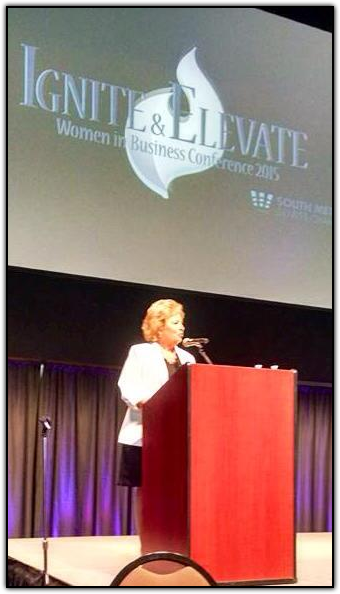
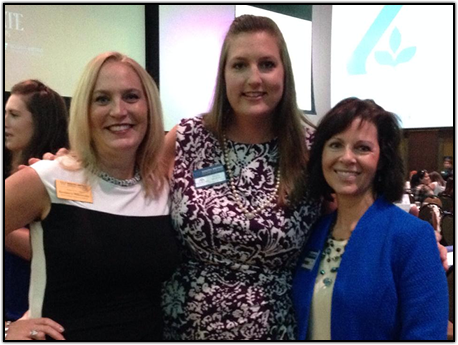 Kimberly Alexander, Holly Mullins and Sue Kenfield
Kimberly Alexander, Holly Mullins and Sue Kenfield
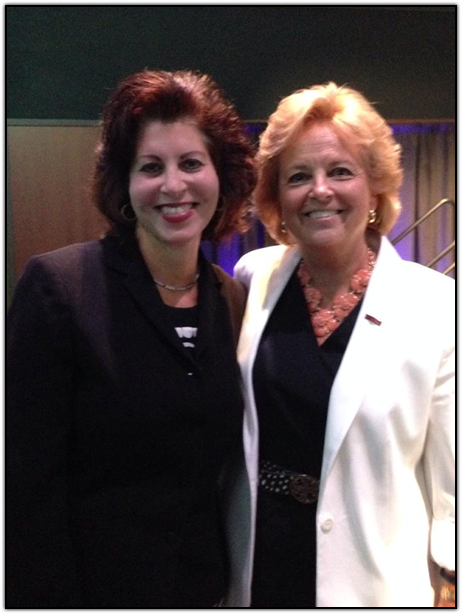 CH2M CEO Jacque Hinman and WINGS OF HOPE founder Maureen Shul
CH2M CEO Jacque Hinman and WINGS OF HOPE founder Maureen Shul
July 2015
WINGS OF HOPE was honored to be a participant in the first North American Pancreatic Cancer Organizations Conference held in New York City. Leaders from 21 pancreatic cancer organizations in the United States and Canada met to discuss ways a more collaborative effort can help the overall cause of raising more awareness, advancing the research and assisting patients and their families while also sharing their mission-related goals, engaging as leaders and cultivating potential partnerships. The attendees were unanimous in their desire to continue this dialogue by having a conference on a regular basis. The conference was organized by Barbara Kenner of the Kenner Family Research Fund and Julie Fleshman of Pancreatic Cancer Action Network.
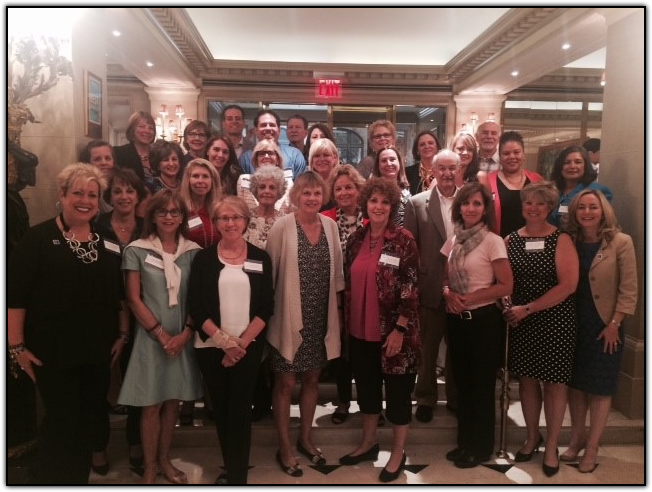
Leaders from 21 pancreatic cancer organizations meet in New York City.
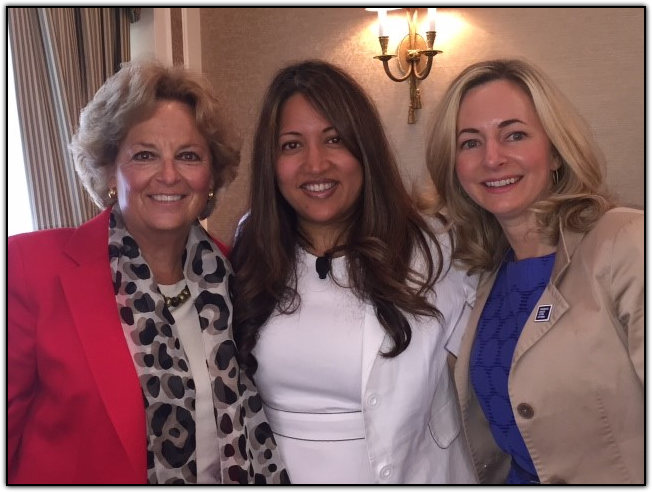
Maureen Shul (Wings of Hope), Ruma Bose (President of the Chobani Foundation and author of Mother Teresa, CEO) and Julie Fleshman (CEO of Pancreatic Cancer Action Network).
JUNE - 2015
PETER JONES, of THE VILLAGER, covers the May 28th Wings of Hope event:
SR-71 crew takes audience on memorable flight
BY PETER JONES STAFF WRITER
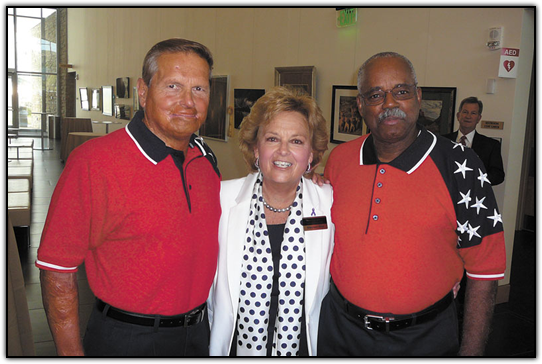
Pilot Brian Shul and navigator Walter Watson may have been among the select few to fly the Air Force’s high-speed SR-71 Blackbird – but they are also among the many whose families have been ravaged by pancreatic cancer.
Shul’s sister, Maureen, the former mayor of Castle Pines, founded Wings of Hope for Pancreatic Cancer Research after both their mother and younger brother died from one of the most fatal and least understood forms of cancer.
“Maureen, we’re really proud of you,” the pilot said during the fourth annual Wings of Hope benefit May 28 at the Lone Tree Arts Center.
After other speakers had told stories of losing family members shortly after their diagnoses, Watson relayed his added connection to the pilot-partner with whom he once flew a wide range of death-defying missions around the world.
“I’ve never shared this. My father died of pancreatic cancer,” the retired navigator said. “On Nov. 6, he was in the hospital. The diagnosis came about three days later and he was gone before Thanksgiving.
Shul and Watson were the keynote speakers at last week’s annual benefit, which raises funds for pancreatic-cancer research at the University of Colorado.
The two were partners in a variety of flights on the SR-71, a once highly classified strategic reconnaissance aircraft – a near rocket that among other claims to fame remains the world’s fastest air-breathing manned aircraft.
“You could bake cookies on that window,” Shul told the audience. “If you fired a high-power hunting rifle, the bullet exits the muzzle at 3,100 feet per second. The aircraft would cruise with ease on a climb at 3,200 feet per second. We moved faster than a speeding bullet. Occasionally, we would leap tall buildings in a single bound.”
The SR-71 crew may have been “supermen” of a sort, but they were almost more like space explorers when it came down to those comic-book comparisons.
“We didn’t wear capes, but we did wear spacesuits,” Watson added, “essentially the same spacesuit the shuttle [astronauts] wore. … This suit is fitted to you at your best. I will tell you, it becomes a challenge somewhere around the fifth of January after Thanksgiving and Christmas.”
Only 93 Air Force pilots flew the nation’s premier unarmed spy plane. Considered the most remarkable aircraft of the 20th century, the SR-71s were hand-constructed and made of titanium that was designed to withstand 900-degree heat. The craft used its own unique nonflammable fuel.
“Keep in mind, you had to invent technology to build an airplane that nobody could build,” Shul said. “… You could throw a match at that bucket of fuel and it would extinguish the match.”
Training to operate the aircraft could be as demanding as the plane itself.
“It’s like having a root canal every other day,” Watson said.
The team’s 1980s-era missions ran the gamut from surveying an international conference in North Korea to providing reconnaissance during the 1986 Libyan crisis to searching for Soviet missiles at the North Pole. By happenstance, Shul and Watson would become the only SR-71 pilots to fly three missions in three days.
“We could do things satellites couldn’t do,” Shul said. “We could look underwater. We could track submarines. We could look through weather. We found a man in the Pacific Ocean one time. He was sailing around the world by himself. He got lost.”
Perhaps most amazing was the fact that Shul was able to fly a plane at all in the ‘80s, much less an aircraft as demanding as the SR-71. During the Vietnam War, the then-fighter pilot had been shot down along the Cambodian border. Unable to eject, he was severely burned and underwent numerous surgeries and physical therapy.
In the hospital, Shul was told he would never fly again.
“I wanted to get back into life, basically,” he said. “When I finally did get out of the hospital, I had a second chance. … I felt like I was starting over. I was like a 2-year-old. It made commanders pretty nervous to have a 2-year-old [in the cockpit].”
Shul and Watson eventually collaborated on the bestselling book The Untouchables.
Of all their adventures, the takeoff, itself, could be the most exciting.
“The airplane was literally transitioning from being a moving piece of titanium to being the rocket that it really is,” Watson said.
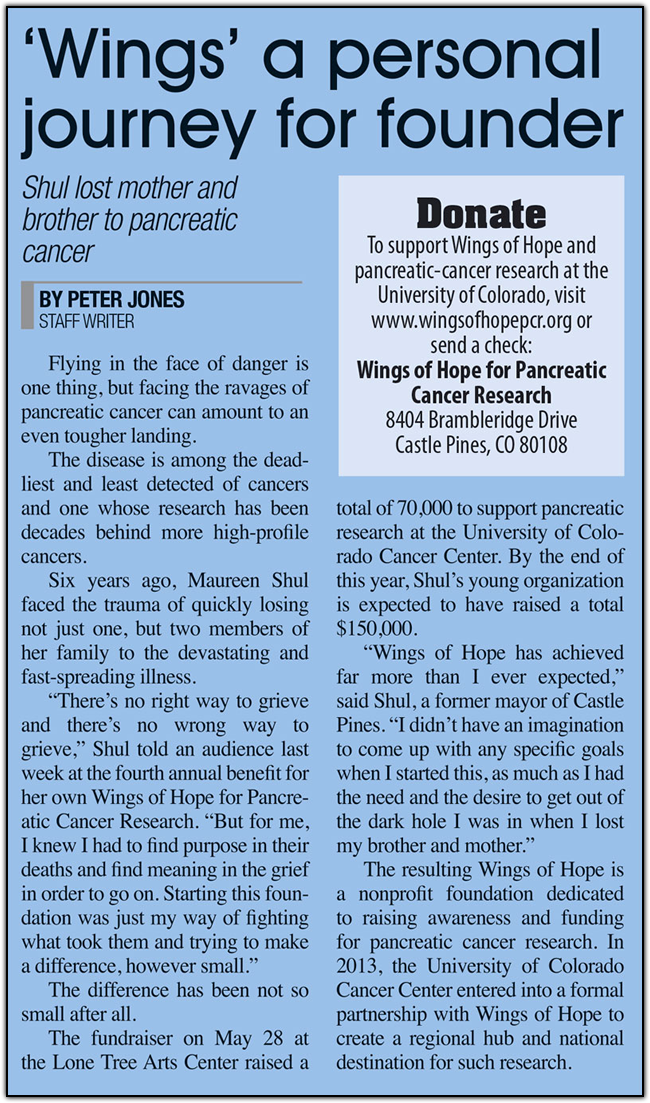
APRIL - 2015
Pancreatic cancer research at University of Colorado gets a lift from Wings of Hope
Wings of Hope for Pancreatic Cancer Research is relatively new in the crowded world of nonprofit organizations, but is already making an impact by creating the first endowed fund for pancreatic cancer research at the University of Colorado.
Maureen Shul, who led the effort to incorporate the City of Castle Pines and became its first mayor, founded Wings of Hope in 2012 after losing her brother and mother to pancreatic cancer within months of one another.
Like most people, Shul had no idea that by the time someone is diagnosed, they are usually in the advanced stages of the disease, rendering treatments ineffective. A test has not yet been developed for early detection of pancreatic cancer.
“In this era of limited research funding,” says Colin Weekes, MD, PhD, director of pancreatic cancer research at University of Colorado School of Medicine, “It has been the support of Wings of Hope that has allowed us to translate laboratory findings into clinical trial strategies for implementation for patients, ultimately bringing significant change and progress for patients and their families.”
Despite the prediction that by 2020 pancreatic cancer is predicted to rise from the current 4th leading cause of U.S. cancer deaths to the 2nd, it is one of the least recognized and underfunded when it comes to cancer research.
A year after Shul founded Wings of Hope the CU Cancer Center entered into a formal partnership with the foundation providing a collaborative focus for raising awareness and funding for pancreatic cancer research. To date, Wings of Hope has contributed more than $150,000 to keep pancreatic cancer research moving forward. The most recent donation of $95,000 was made April 10, 2015.
At the same time, Wings of Hope became the first to establish an endowment at CU specifically for pancreatic cancer research.
“While Wings of Hope will always be my personal tribute to my brother and mother, the effort is truly for every pancreatic cancer patient, their families and friends, in the hope that the ongoing research taking place at the University of Colorado Cancer Center will lead to early diagnostic methods, more effective treatments and ultimately a cure,” says Shul.
In an effort to continue raising money for research, Wings of Hope is presenting the SR-71 BLACKBIRD SPY PLANE CHRONICLES on May 28th at The Lone Tree Arts Center. Shul’s surviving brother, SR-71 pilot Brian Shul, and his navigator Walt Watson, will give a presentation on their most exciting covert spy plane missions as described in their best-selling book, “The Untouchables.”
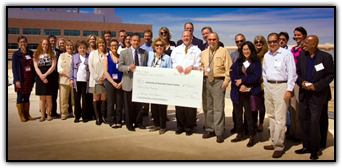
The Wings of Hope check presentation
MARCH - 2015
TKH REALTY PRESENTS CHECK TO WINGS OF HOPE
On behalf of WINGS OF HOPE board member Stacy Ohlsson, TKH Realty owners Tony and Karen Hinkel presented WINGS OF HOPE with a $4,500 check for pancreatic cancer research. TKH Realty is a Denver based philanthropic real estate company that donates 25% of their gross commission to local nonprofits. Sincere thanks to TKH Realty for their support of the effort to raise awareness and funding for the pancreatic cancer research ongoing at the University of Colorado Cancer Center.
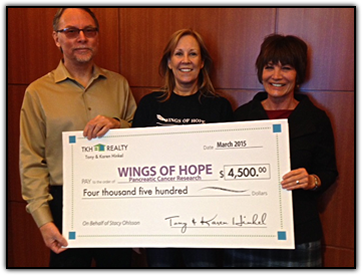
Tony Hinkel, Stacy Ohlsson and Karen Hinkel
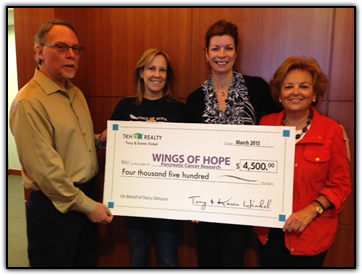
Tony Hinkel, Stacy Ohlsson, Kathryn Haber and Maureen Shul
Hitting Pancreatic Cancer From Two Sides
BY GARTH SUNDEM IN C3 MAGAZINE, IN THE CLINIC · DECEMBER 15, 2014
BARISH EDIL SEES NEW HOPE FOR MOST FEARED CANCER IN MINIMALLY INVASIVE SURGERY AND VACCINES
“People with pancreatic cancer are a unique group, brave and strong, and that inspires you,” says Barish Edil, MD, associate professor of GI tumor and endocrine surgery. He says that he was first attracted to working with pancreatic cancer due to its technical challenge, but is now, “in it for emotional reasons.”
While completing his fellowship in complex surgical oncology at Johns Hopkins University, Dr. Edil pioneered the technique of performing the complex operation known as the Whipple, laparoscopically – meaning that instead of being an open surgery, Edil performs the procedure for pancreatic cancer with instruments inserted through a half dozen tiny incisions.
“It was like coming up with a whole new operation,” Edil says.
Edil performed the first laparoscopic Whipple at Hopkins in 2008 and the first in Colorado shortly after joining the University in 2012. He and his team have now performed over 100 laparoscopic Whipple operations and have started training visiting teams of surgeons in the technique.
“We had a group here from China and now they’ve performed ten at their institution,” Edil says.
Dr. Edil also runs a research laboratory that works with the ability of the body’s immune system to recognize and target cancer. This is the cutting-edge field called immunotherapy – basically, because tumor tissue grows from the body’s own cells, the immune system fails to control tumors the way it controls foreign bad guys like the flu. Edil and other researchers at CU and elsewhere are trying to change that, with Edil working specifically on vaccines meant to prime the immune system to notice and attack cancer tissue.
Interestingly, minimally invasive surgery and cancer vaccines aren’t as different as they seem. “Open surgery is immunosuppressive – it turns off the body’s ability to rid itself of foreign and invading material. With minimally invasive surgery and vaccines, we want to make surgery less immunosuppressive while stimulating the immune system. This way we come at the problem from two different directions,” Edil says.
Due in part to the fact that pancreatic cancer rarely shows any symptoms until the disease has spread, it carries with it one of the highest cancer morbidities. According to the American Cancer Society, 5-year survival rates for range from 14 percent of people diagnosed with the earliest form of the disease to only one percent of people who are more commonly diagnosed with late-stage disease.
But, “I absolutely believe there is hope on the horizon for pancreatic cancer,” Edil says. “Ten years from now, I expect we will have better chemotherapy, better surgery, more immunotherapy, all leading to better survival.”
As if developing a new technique in one of the most challenging fields of surgery, and leading the search for vaccines within the relatively new field of cancer immunotherapy weren’t enough, Edil has three kids and tries his best to be a sports dad. “I have a wonderful wife who takes a lot of the burden off me,” Edil says while sitting under a beautiful oil painting his wife painted. “But I love it. I try to make their events.”
When he’s not operating or in the lab or being dad, watch out for Barish Edil on the Department of Surgery hockey team. (Yes, there is a Department of Surgery hockey team…)
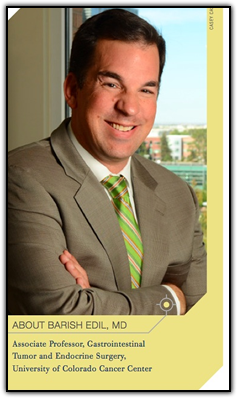
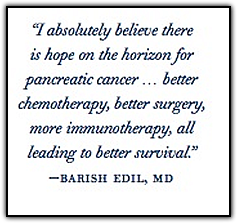
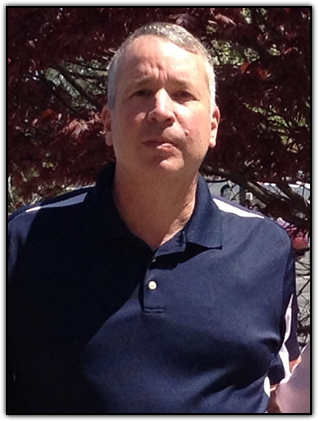
Calvin Henry Bowker, Jr.
November 18, 2014
It is with deep heartbreak we share the passing of Calvin Henry Bowker, Jr., brother of Wings of Hope board member Kathryn Haber, from pancreatic cancer. At the October 30th Wings of Hope benefit, Kathryn eloquently shared with the audience losing her father to pancreatic cancer and her brother's courageous battle against the same disease.
Our deepest and most heartfelt sympathy and prayers to Kathryn and all her family at this difficult time, along with our resolve to keep raising the awareness and funding for the pancreatic cancer research at the University of Colorado Cancer Center, so that one day soon we will have early diagnostic methods, more effective treatments and ultimately a cure for this relentless disease.
To support this effort in memory of Cal Henry Bowker, Jr., and all those taken from us by pancreatic cancer, please click the DONATE button at the bottom of this page.
November 13, 2014 - WORLD PANCREATIC CANCER DAY
Today, November 13th, is the first ever WORLD PANCREATIC CANCER DAY. WINGS OF HOPE FOR PANCREATIC CANCER RESEARCH supports every effort to raise awareness of this horrific disease, and invites you to support the local pancreatic cancer research taking place at the University of Colorado Cancer Center. Every dollar raised by WINGS OF HOPE goes to the CU Cancer Center for their pancreatic cancer research with the goal of finding early diagnostic methods, more effective treatments and ultimately a cure.
PANCREATIC CANCER SYMPTOMS
If you persistently experience one or more of the following symptoms which are not normal for you, do not ignore them! Contact your doctor immediately.
- Mid-back pain
- Indigestion not responding to prescribed medication
- New onset diabetes not associated with weight gain
- Fatigue
- Low mood or depression
- Upper abdominal pain
- Pain on eating
- Jaundice/yellowing of the skin and eyes
- Skin itching
- Pale, smelly stools
- Unexplained weight loss
Make a difference and help support WINGS OF HOPE FOR PANCREATIC CANCER RESEARCH in their efforts to raise awareness and funding for the pancreatic cancer research ongoing at the CU Cancer Center.
October 2014 - DOUGLAS COUNTY NEWS-PRESS SPOTLIGHTS WINGS OF HOPE BENEFIT TO RAISE RESEARCH FUNDING FOR LOCAL PANCREATIC CANCER EFFORTS
October 2014 - READ THE VILLAGER NEWSPAPER FRONT PAGE INTERVIEW WITH WINGS OF HOPE KEYNOTE SPEAKER ERIC ALEXANDER
Mt. Everest presentation to benefit pancreatic cancer research at CU Cancer Center on Oct. 30
Denver Post, Your Hub, October 2, 2014
Wings of Hope for Pancreatic Cancer Research presents an evening with author and mountain climber Eric Alexander, who defied all odds and scaled Mt. Everest while guiding his blind friend, Erik Weihenmayer, to its 29,035 foot summit.
The event is Thursday, October 30 at The Wildlife Experience. Doors open at 6:00 pm and will include hors d’oeuvres, drinks, desserts and live auction. Referred to as the most challenging adventure in mountaineering, renowned climber and motivational speaker Eric Alexander will recount his incredible story of hope, perseverance and survival scaling Mt. Everest.
Maureen Shul, former mayor of the City of Castle Pines, founded Wings of Hope in 2012 after losing both her brother and mother to the disease within months of one another.
“Very few people are aware of the tremendous strides being made in pancreatic cancer treatments and research right here at Anschutz Medical Campus,” stated Shul. “It is the mission of this foundation to keep raising awareness and funding for the CU Cancer Center pancreatic cancer research through events such as this one.”
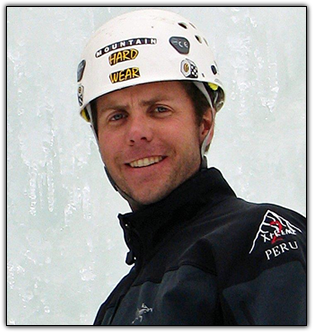
Eric Alexander
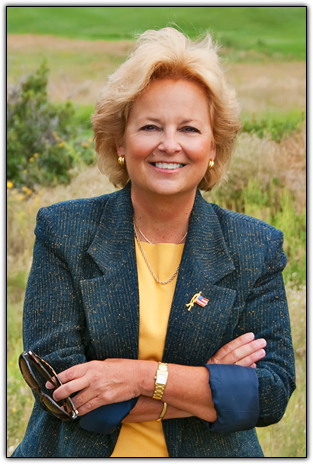
Maureen Shul, Founder, Wings of Hope for Pancreatic Cancer Research
Colin Weekes, MD, PhD, Accepted Into ASCO Leadership Development Program
BY GARTH SUNDEM IN HONORS, LATEST NEWS · JUNE 23, 2014
University of Colorado Cancer Center member, Colin Weekes, MD, PhD, was recently accepted into the prestigious American Society for Clinical Oncology (ASCO) Leadership Development Program for years 2014-15. Weekes is an associate professor in the Division of Medical Oncology at the CU School of Medicine with a joint appointment at the Denver Veteran’s Administration Medical Center. He is a member of the University of Colorado Cancer Center Gastrointestinal and Developmental Therapeutics Programs.
“The goal of the program is to train young researchers for leadership positions within ASCO and at their institutions. I’m honored to be included in this class of twelve exciting, young pioneers,” Weekes says.
During the one-year program, ASCO will present participants with a challenge program, which participants will develop and then present to the ASCO Board of Directors at the conclusion of the year. In addition, participants will convene four times throughout the year for formal leadership training. Each year, the competitive application process results in 12 young cancer investigators accepted into the program. Weekes follows CU Cancer Center colleagues Wells A. Messersmith, MD, and Thomas R. Flaig, MD, both of whom completed the program in previous years and both of whom have gone on to lead initiatives within ASCO and the CU Cancer Center.
Weekes hopes that his experience with the program will allow leadership opportunities to promote minority enrollment in clinical trials.
“The barriers to minority enrollment in clinical trials is multifactorial and include Lack of information and access to clinical trials, historical events resulting in distrust in the clinical research process, as well as socioeconomic issues for some patients,” Weekes says. As an example, he points out that for phase 1 clinical trials, patients frequently must spend two or three days per week at the treatment center, which can be challenging in terms of travel costs and lost wages for patients with limited financial resources.
“On a personal level, I just want to gain more leadership skills to be a good leader for the people I work with here at the Center. On a larger scale, I hope to begin to understand how to develop initiatives in cancer care,” Weekes says.
Please join the CU Cancer Center in congratulating Dr. Weekes on his acceptance to this prestigious program, which will connect one of our most promising young researchers with the ability to create change on a national level.
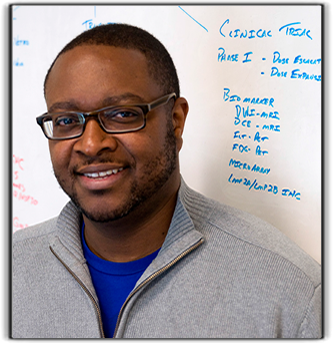
Colin Weekes, MD, PhD
2/11/14 - WALT IMHOFF, In Memoriam
With deep sadness we mourn the loss of Walt Imhoff, Denver financier and philanthropist, and first donor/supporter of WINGS OF HOPE FOR PANCREATIC CANCER RESEARCH.
Walt Imhoff was the first person I reached out to when WINGS OF HOPE was formed. His beloved wife Georgia had lost her battle with pancreatic cancer, and in sharing my own losses to this relentless disease with him, we forged a friendship built on shared grief and a passion to fight back in whatever way we could.
In that first meeting several years ago, Walt Imhoff not only shared his support for WINGS OF HOPE, but his tears as well for all he lost to this disease.
In loving memory of Walt Imhoff and all those impacted by pancreatic cancer, our efforts continue on stronger than ever to fund the pancreatic cancer research ongoing at CU Cancer Center - Anschutz Medical Campus.
Maureen A. Shul

Stacy Ohlsson, Brian Shul, Betsy Hogan and Walt Imhoff at 2013 WINGS OF HOPE event
Letter by Maureen A. Shul published in the Denver Post November 1, 2013
With November being National Pancreatic Cancer Awareness month, it is important to note the progress being made on this disease on the Anschutz Medical Campus.
Since the opening of a multi-disciplinary clinic at the University of Colorado Cancer Center last year, more than 200 pancreatic cancer patients have been seen, giving patients access in one day to every specialist necessary to design a complete and personalized plan of treatment. In that same time, more than 100 pancreatic cancer surgeries have been performed, making the CU Cancer Center a premier destination nationwide for pancreatic cancer care.
The center also participated in the clinical trials that resulted in the recent FDA approval of Abraxane for treatment of pancreatic cancer.
For those of us who have lost loved ones to this horrific disease, it is not enough to have pancreatic cancer mentioned only in obituaries. Awareness of the latest treatments and research taking place right here can make all the difference to patients and family members.
FDA APPROVES ABRAXANE IN COMBINATION WITH GEMCITABINE FOR TREATMENT OF METASTATIC PANCREATIC CANCER
On September 6, 2013, the U.S. Food and Drug Administration approved ABRAXANE® in combination with gemcitabine for the first-line treatment of patients with advanced metastatic pancreatic cancer.
The approval of Abraxane was based on clinical trials involving 861 patients with metastatic pancreatic cancer, the median age of the patients being 63 years.
With no early diagnostic methods or effective treatments for pancreatic cancer, the announcement of this approval was welcomed news for the many impacted by this disease. It has been almost eight years since the last treatment was approved for patients with pancreatic adenocarcinoma, the most common form of pancreatic cancer.
"This treatment approval is extremely important for patients as it represents an incremental improvement in therapy," stated Dr. Colin Weekes, Director, Pancreas Medical Oncology Program, University of Colorado School of Medicine. "This new regimen will serve as a new foundation of combination therapy to which molecular targeted therapies can be added."
WINGS OF HOPE FOR PANCREATIC CANCER RESEARCH is encouraged by this latest advancement in treatments and remains committed to raising awareness and funding for the ongoing pancreatic cancer research at the University of Colorado Cancer Center.
8/2013 - WINGS OF HOPE presents $45,000 donation for pancreatic cancer research to the University of Colorado Cancer Center.
The July 26th presentation, attended by board members and supporters of WINGS OF HOPE, as well as UCCC staff, included Dr. Colin Weekes providing an update on the latest developments in pancreatic cancer research. The WINGS OF HOPE donation will be used to support a human-patient derived xenograft model to help determine the genetic characteristics of a patient's tumor and to develop molecular-based therapeutic strategies encompassing biomarker development.
WINGS OF HOPE founder Maureen Shul expressed gratitude to all those who made the donation possible through their generous support of the foundation and made it known that plans are underway for upcoming events.
For more pictures, click on NEWS.
University of Colorado Cancer Center Administrator Mark Kochevar accepting $45,000 donation from Maureen Shul
WINGS OF HOPE PARTICIPATES IN STEP UP FOR CANCER EVENT
WINGS OF HOPE joined 45 other cancer-related non-profits at the 5th Annual Step Up For Cancer event held at Dick's Sporting Goods Stadium in Commerce City.
Under a perfect and sunny early morning sky, close to 1,000 participants raced, ran and walked the 1735 stadium steps. Others chose to walk the perimeter of the soccer field and some came to cheer on their friends and family members while learning more about the many non-profit organizations involved in cancer awareness, treatment, care and research.
The event was for all ages, from small kids climbing the stadium steps to retirees keeping up with them, some never breaking a sweat.
WINGS OF HOPE will be a participant again next year, organizing teams of supporters to represent and raise funds for WINGS OF HOPE.

Dick's Sporting Goods Stadium
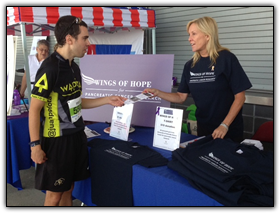
Stacy Ohlsson and Step Up For Cancer participant
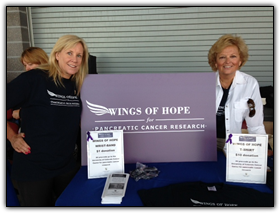
Stacy Ohlsson and Maureen Shul
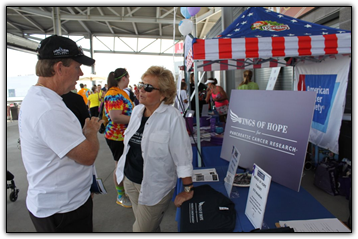
WINGS OF HOPE GIVES $45,000 DONATION FOR PANCREATIC CANCER RESEARCH TO UNIVERSITY OF COLORADO CANCER CENTER
Former Castle Pines mayor raises $45k for cancer
Virginia Grantier vgrantier@ourcoloradonews.com | Posted: Sunday, August 18, 2013 4:30 pm
A foundation started by Castle Pines' first mayor, Maureen Shul, recently gave a $45,000 check to the University of Colorado Cancer Center to help support pancreatic cancer research.
Shul lost her mother and brother to pancreatic cancer within months of each other and later established a foundation called Wings of Hope for Pancreatic Cancer Research.
"Wings of Hope is committed to raising awareness of the pancreatic cancer research and treatments taking place at the CU Cancer Center," said Shul. "We are also committed to making sure people know the specific pancreatic cancer research programs their donations are helping to support." She said the money was raised at an April event at Parker's The Wildlife Experience, where her brother, Brian Shul, a U.S. Air Force pilot, had been a guest speaker.
“We had a sell-out event, which resulted in our being able to present $45,000 to the University of Colorado Cancer Center,” she said. But that's not the end. “We are working on our next events, one of which will include climbing a 'fourteener' to raise funds,” she said. Dr. Colin Weekes, who accepted the check, is an oncologist and an investigator at the cancer center.
Weekes said currently there are few treatment options for these patients. The donation will be used to advance the development of targeted therapies by identifying the genetic biomarkers in pancreatic cancer tumors.
"The donation from Wings of Hope will help us advance the discovery and development of therapies that may improve the outlook for people diagnosed with this type of cancer."
Shul, who led the effort to incorporate Castle Pines, was elected its first mayor in 2007 and served as mayor and then on council until 2012. Pancreatic cancer is the fourth leading cause of cancer deaths in the United States and is projected to rise to the second leading cause by 2020, according to information from Shul. It is estimated that 43,000 Americans are diagnosed each year with pancreatic cancer, with 74 percent not surviving beyond 12 months.
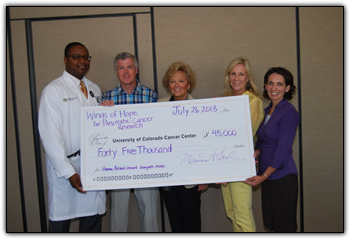
WINGS OF HOPE Board of Directors: Dr. Colin Weekes,
Jim Comerford, Maureen Shul, Stacy Ohlsson, Melanie Avner
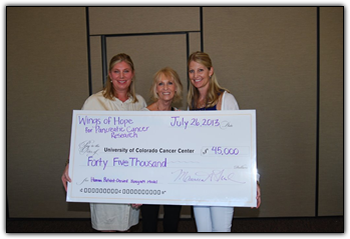
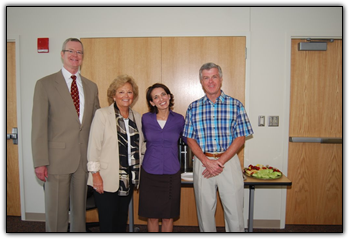
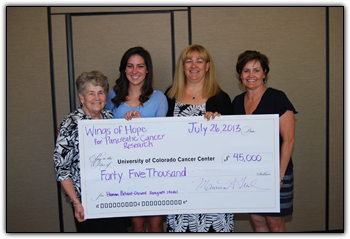
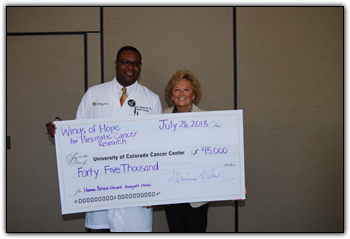
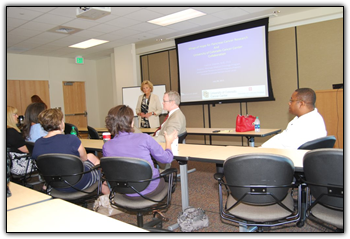
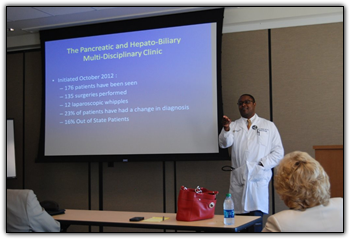
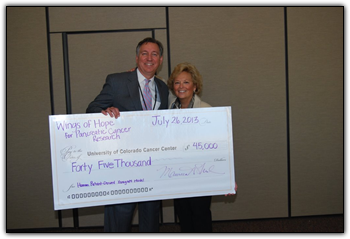
Photos taken by Lynn Hillenburg Zahorik
Teen discovers promising test for early detection of pancreatic cancer.
THANK YOU FOR YOUR SUPPORT!
Warmest thanks to all those who made purchases at Tagawa Gardens through their Give Back Program this past month to help WINGS OF HOPE. A percentage of all the sales made during this time period that mentioned WINGS OF HOPE will be shared with the foundation in the coming weeks.
Your continued support is so important and appreciated! And we hope your gardens are flourishing!
BIG COLORADO LOVE selects WINGS OF HOPE FOR PANCREATIC CANCER RESEARCH as their featured charity for April through June 2013.
Based in Telluride, BIG COLORADO LOVE makes hats, shirts, stickers, and other popular items, donating 10% of their profits to Colorado charities. Their selection of WINGS OF HOPE was in memory of Tamara Guttman Theemling who fought pancreatic cancer for over 3 years before passing away in 2012. The model of a Colorado mountain woman, Tamara lived, loved and explored the mountains and rivers of Colorado in every way she could, and is deeply missed by her many friends and family.
Your purchasing items from BIG COLORADO LOVE (www.bigcoloradolove.com) through June will help support WINGS OF HOPE. In turn, your liking them on Facebook and spreading the word will help support BIG COLORADO LOVE.
Former mayor offers ’hope’ in cancer fight
By Chris Michlewicz
Maureen Shul was riding high as the first mayor of Castle Pines when her life came crashing down.
It wasn’t a political scandal that forever altered her career path and, ultimately, the course of her life. It was the consecutive losses of two of her staunchest supporters: her brother and mother. And their deaths were attributed to the same illness.
Shul admits that she didn’t even know what a pancreas was, let alone her unfamiliarity with the aggressive nature of the cancer that infiltrates the internal organ. Her family does not have a history of cancer, and there were no warning signs before her brother, Victor, was diagnosed in 2005.
His was something of a rare story; he battled for four years before passing away in 2009. Others are taken suddenly, as was the case with Shul’s mother, who survived only three months after her August 2009 diagnosis.
“The losses were so profound and so great, I had to steady myself and learn how to keep going,” she said.
Shul coped, in part, by joining national efforts to raise money for pancreatic cancer research. Then she learned that intensive research was occurring in the Denver area, and immediately shifted her focus. She created Wings of Hope for Pancreatic Cancer Research , her own nonprofit foundation, and in February partnered with those Denver researchers.
Doctors and scientists at the University of Colorado Cancer Center at the Anschutz Medical Campus are engaged in multi-pronged studies to try and determine the cause of pancreatic cancer, the most effective treatment methods and ways to detect it much earlier.
The first fundraiser for Wings of Hope, scheduled for April 25 at The Wildlife Experience, is nearly sold out, reflecting the high number of people in Douglas County with a great interest in stopping the disease’s advance. The best part is that Shul and the nonprofit’s board of directors will have direct discussion with researchers to determine the best use of the funds that are raised.
“Of all of the things I’ve ever been involved with, nothing has been more meaningful or significant as starting this foundation,” Shul said.
The charity event will not only highlight advances in research and raise awareness, it will feature Shul’s brother, Brian, a bestselling author and former SR-71 pilot, as the keynote speaker. Brian Shul will relate his harrowing story of survival after being shot down over Vietnam. His family received notification that he died, and it wasn’t until 48 hours later that they learned he was alive.
When asked what her brother and mother would think about her actions in the wake of their untimely deaths, Shul says she hopes they would be proud
“We’re making a contribution in a way that is honoring them as well as helping me get through all of this,” she said. “I’m doing what I’m supposed to be doing. I couldn’t just walk away from it.”
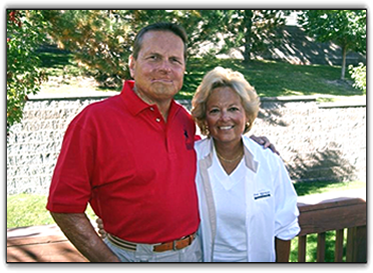
Brian Shul and Maureen Shul
Maureen Shul Wings of Hope interview, April, 2013
Partnership aims to raise awareness for pancreatic cancer
University of Colorado Cancer Center joins forces with Wings of Hope
AURORA, Colo. ( Jan. 29, 2012) - University of Colorado Cancer Center and Wings of Hope for Pancreatic Cancer Research have joined forces to raise awareness about pancreatic cancer and boost funding for pancreatic cancer research and related CU Cancer Center programs.
“We are happy to partner with Wings of Hope in our efforts to find effective therapies for those with pancreatic cancer,” says Colin Weekes, MD, PhD, medical oncologist and member of the CU Cancer Center.
Pancreatic cancer is the 4th leading cause of cancer death in the United States and is projected to rise to the 2nd leading cause by 2020. It is estimated that 43,000 Americans are diagnosed each year with pancreatic cancer, 74 percent will not survive longer than 12 months.
“In terms of the magnitude of human suffering it causes, pancreatic cancer is underfunded and this collaboration will help us address this” says Dan Theodorescu, MD, PhD, Director of the CU Cancer Center.
“There is no broadly accepted early detection method for pancreatic cancer and effective treatments are limited. But we hope to improve the outlook for people with pancreatic cancer by discovering and developing biologically targeted therapies,” Weekes says.
Wings of Hope was founded in February of 2012 by Maureen Shul, the former mayor of Castle Pines, after she lost two family members to pancreatic cancer. Wings of Hope is dedicated to supporting research and clinical care at CU Cancer Center.
“The pancreatic cancer research and treatment taking place at CU Cancer Center is second to none and it is a privilege to have Wings of Hope a focused part of the effort to raise awareness as well as funding for this incredibly important work,” says Shul.
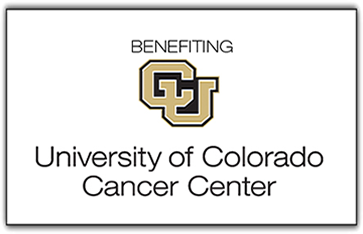

RECALCITRANT CANCER RESEARCH ACT SIGNED INTO LAW JANUARY 3, 2013
After being passed by Congress in December 2012, the RECALCITRANT CANCER RESEARCH ACT was signed into law by President Obama on January 3, 2013.
This legislation, attached to the National Defense Authorization Act, requires the National Cancer Institute (NCI) to examine its current research efforts on cancers with very low survival rates and work to develop early detection methods and better treatment options to help improve outcomes for those diagnosed with the most deadly forms of cancer, including pancreatic and lung cancer.
As the first legislation to specifically include and focus on pancreatic cancer, the NCI will be required to establish scientific frameworks for pancreatic and other deadly cancers including rigorous evaluations of existing research efforts and the progress being made in the prevention, detection, diagnosis and treatment of these deadly cancers.
Realizing the critical importance of this legislation in the advancement of specific and focused research, WINGS OF HOPE for PANCREATIC CANCER RESEARCH is dedicated to raising awareness and funding for the cutting edge research, clinical trials and treatments currently ongoing at the University of Colorado Cancer Center’s Pancreatic Cancer Research Program.
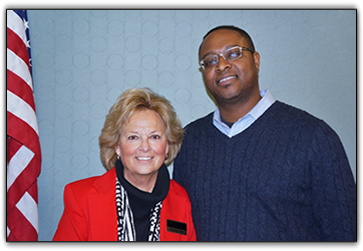
Maureen Shul and Dr. Colin Weekes
Below is a commentary written by Maureen Shul for the Denver Post on 11/4/2012.
SHINING A LIGHT ON PANCREATIC CANCER
November is National Pancreatic Cancer Awareness Month. For most, that may be the only time they hear about pancreatic cancer. For too many others, it will be one more heart breaking reminder of a devastating disease that family and friends have been lost to.
When my brother was diagnosed with pancreatic cancer, I readily admit I had no knowledge of what a pancreas was, what it did and what it meant to have cancer there. No amount of research softened the statistics. Only two out of ten people with pancreatic cancer survive beyond one year after being diagnosed, and fewer than six percent will survive beyond five years. That survival rate has not changed in the last 40 years.
I expanded my research to the most well known medical institutions throughout the country, all confirming what I knew but did not want to believe. Pancreatic cancer has no known cause, no early detection methods, no effective treatments and no cure. By the time someone is diagnosed, it is almost always too late for any type of effective treatment.
My brother was as strong, healthy and courageous as they come, but he was no match for a disease that came with no warning and remained relentless in its horrific grasp. His suffering and fight lasted four years.
Three months after losing my brother, my mother was diagnosed with pancreatic cancer. She died ninety devastating days later.
While in the midst of grief from such profound losses, I met one of the physicians from the University of Colorado Cancer Center specializing in pancreatic cancer. It was a revelation to learn that the University of Colorado’s Pancreatic Cancer Research Program boasts and continues to attract an elite group of physicians specializing in the research and treatment of pancreatic cancer. What sets their work apart from others is their multi-disciplinary approach to patient treatment, exemplified by the personalized and focused treatment plan developed for each patient by a team of physicians representing the disciplines of medical oncology, surgical oncology, radiation oncology, pathology, radiology and interventional gastroenterology.
Their goal is nothing short of developing a leading national academic pancreatic cancer research program here at the University of Colorado Anschutz Medical Campus, and they are well on their way. Cutting edge research, access to the most advanced treatments, highest levels of patient care and extensive clinical trials are all taking place right now and right here.
To help raise awareness for the focused ongoing efforts at the University of Colorado Cancer Center’s Pancreatic Cancer Research Program, the Wings of Hope for Pancreatic Cancer Research Foundation was formed earlier this year.
Pancreatic cancer is currently the 4th leading cause of cancer death in the United States. By 2020, it is anticipated pancreatic cancer will become the 2nd leading cause of cancer death in the United States. We have the opportunity right now to help change that projection by supporting the efforts and strides being made in our own back yard.
A leading medical institution in Texas recently announced a “moon shot” effort against eight specific forms of cancer, akin to the all out effort for landing a man on the moon 50 years ago. Pancreatic cancer was not included among the eight cancers. The time is now for pancreatic cancer to be brought out into the open, to where it will no longer be the most underfunded and least studied among the major cancers.
We can be stunned by statistics and numbed by grief, but we must not stand by while this disease expands its devastating reach.
The dedicated physicians at the University of Colorado Cancer Center’s Pancreatic Cancer Research Program are not giving up on their goal to have their program second to none in the fight against pancreatic cancer.
And neither should we.
Maureen A. Shul, former mayor of Castle Pines, is founder of Wings of Hope for Pancreatic Cancer Research.

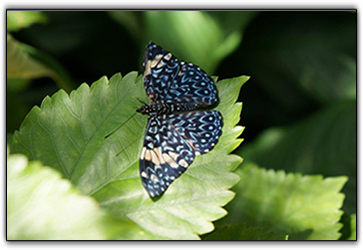

Below is a commentary written by Maureen Shul for the Denver Post on 10/08/2011.
Bringing pancreatic cancer out of the shadows
Pancreatic cancer was in the news this week for all the reasons we dread most.
Scientist Ralph Steinman died from pancreatic cancer just three days before the announcement was made that he had won the Nobel Prize for medicine. A pioneer in understanding how cells fight disease, Steinman was using his own research and discoveries in his battle with pancreatic cancer.
The passing of Steve Jobs from a rare form of pancreatic cancer (pancreatic neuroendocrine tumor) devastated everyone who believed that if anyone could beat the odds, he could. That he fought for nearly eight years upon being diagnosed with this rare form of cancer and still managed to remain at the forefront of altering our culture and technology is a testament to the fight he endured.
These two most recent public deaths involving pancreatic cancer are a stark reminder of the severity of this deadly disease.
It becomes easy to understand why races and walks comprised of pancreatic cancer survivors who beat the disease will not take place anytime soon.
The five-year survival rate for pancreatic cancer is only 6 percent. For 40 years, this survival rate has remained in the single digits, despite the increase in those being diagnosed, and despite the fact that it is the fourth-leading cause of cancer death. This year, 44,000 Americans will be diagnosed with pancreatic cancer. Of those, close to 38,000 will die from the disease.
There are no conclusive tests for early diagnosis, there are no effective treatments, and there is no cure.
Pancreatic cancer is the most underfunded, under-recognized and least studied of all major cancer killers, receiving only 2 percent of the National Cancer Institute's research budget. That scientist Steinman was using his own research in his battle with pancreatic cancer provides heartbreaking insight into how slim the arsenal is in fighting this disease. As breast cancer was years ago, pancreatic cancer remains in the shadows when it comes to awareness and research funding, a fact that cuts through the hearts of those who have lost loved ones to this horrific disease
While legislation is pending before Congress that will implement better targeted research, the national Pancreatic Cancer Action Network continues investing in a research strategy that will advance early diagnostics, more effective treatments and increase chances of survival.
In mid-2009, I lost my brother to pancreatic cancer after his four-year battle with a disease that proved relentless in its tortuous power. Several months after he died, my mother was diagnosed with pancreatic cancer and passed away three months later.
After losses this profound and close to each other, it is almost as if you must learn how to walk and breathe all over again. But there comes a moment in the midst of grief where you are compelled to do something, for the loved ones lost, and for those who have been, who are or who will be forced on that same dark journey.
In honor of my mother and brother, I am organizing a benefit to help raise awareness and increased research funding for pancreatic cancer. The Wings of Hope benefit will be held Oct. 22 at Wings Over The Rockies Air & Space Museum. For more information, go to pancan.org/wingsofhope.
As pancreatic cancer continues its steady and shattering assault on families, we must make it a national priority and give patients a fighting chance. The statistics can and must change.
There come events in our lives that demand of us more than being a bystander in the bleachers doing nothing. This is that moment, for all of us.


Below is a commentary written by Melanie Avner for the Denver Post on 11/08/2011.
Pancreatic cancer funds don't match its devastation
When Carnegie Mellon Professor Randy Pausch gave his unforgettable "Last Lecture," and publicly shared his battle with pancreatic cancer, my heart ached for him, his wife and his three beautiful children. I knew the statistics, and I knew pancreatic cancer was horrendous, scary and devastating. What I didn't know then — what none of us knew — was that the very same cancer was spreading in my mother's body.
One week before my mother received the news that she had a mass on her pancreas, she started to feel unwell, just not herself. But what puzzled and alarmed her most was the severe itching in her hands and feet. She also mentioned the strange color of her urine.
Prior to these symptoms, which came on suddenly, she felt fine. In fact, she was the picture of health. My mother, who was 63, ate right, exercised and always knew the latest cancer research and findings. She took care of herself.
She, too, knew about pancreatic cancer long before it changed her life. Though she no longer worked in a hospital, my mother was a registered nurse. So when she got that call on April 17 with the results of her CT scan, the first words that came to her mind were: "death sentence."
My mother had that reaction because the statistics are grim. According to the Pancreatic Cancer Action Network, an advocacy group that works to raise funds and awareness to fight pancreatic cancer, the five-year survival rate for pancreatic cancer is less than 5 percent, making it the most lethal cancer in the United States. In most cases — nearly 90 percent — the disease has already metastasized before it is diagnosed, ruling out surgery, which is the best hope for long-term control of the disease.
By the time my mother exhibited symptoms, the cancer had already spread to her liver. Surgery to remove the tumor was not an option. Just two weeks after she began to feel ill, my mother was diagnosed with stage IV pancreatic cancer and told she likely had less than a year to live.
Pancreatic cancer is the fourth-leading cause of cancer death in the United States. The Pancreatic Cancer Action Network reports that in 2008, more than 38,000 Americans will be diagnosed with pancreatic cancer and nearly 34,000 will die. The survival rate has remained largely unchanged in the last 30 years.
Pancreatic cancer research constitutes less than 2 percent of the National Cancer Institute's federal research funding — a figure far too low given the severity of the disease. From a scientific research perspective, pancreatic cancer is where breast cancer was in the 1930s. Advancing pancreatic cancer research into the 21st century is dependent upon the increase of basic scientific research.
November is Pancreatic Cancer Awareness Month. I wish my mother could have lived to see that such a month even existed. She died on Aug. 20, just four months after her diagnosis. Four months. Four months from diagnosis to death. That is pancreatic cancer.
It would have been understandable for me to say that I never wanted to see, speak or hear about pancreatic cancer again after the devastation and pain that it caused my family. And I'm sure many others have felt exactly the same. That is probably what happens far too often.
But we cannot continue to turn our backs on pancreatic cancer. As terrifying as it is to face straight on, we must. We must demand more funding for research, better screening and detection, improved treatments, and increased education and awareness. The Pancreatic Cancer Action Network has made significant strides, but unfortunately, there is a long road ahead.
As Pausch said several months before he died, "Pancreatic cancer is disorienting, it's frightening, it's horrifying. The way you beat it is you give a lot of smart people the funding to do their job." I hope you'll join me in doing just that. You'll be creating hope for those courageous individuals who are living with pancreatic cancer and honoring those we have lost to this terrible disease.


JOIN THE EFFORT…BE A PART OF THE POSSIBLE, BE THE HOPE.



